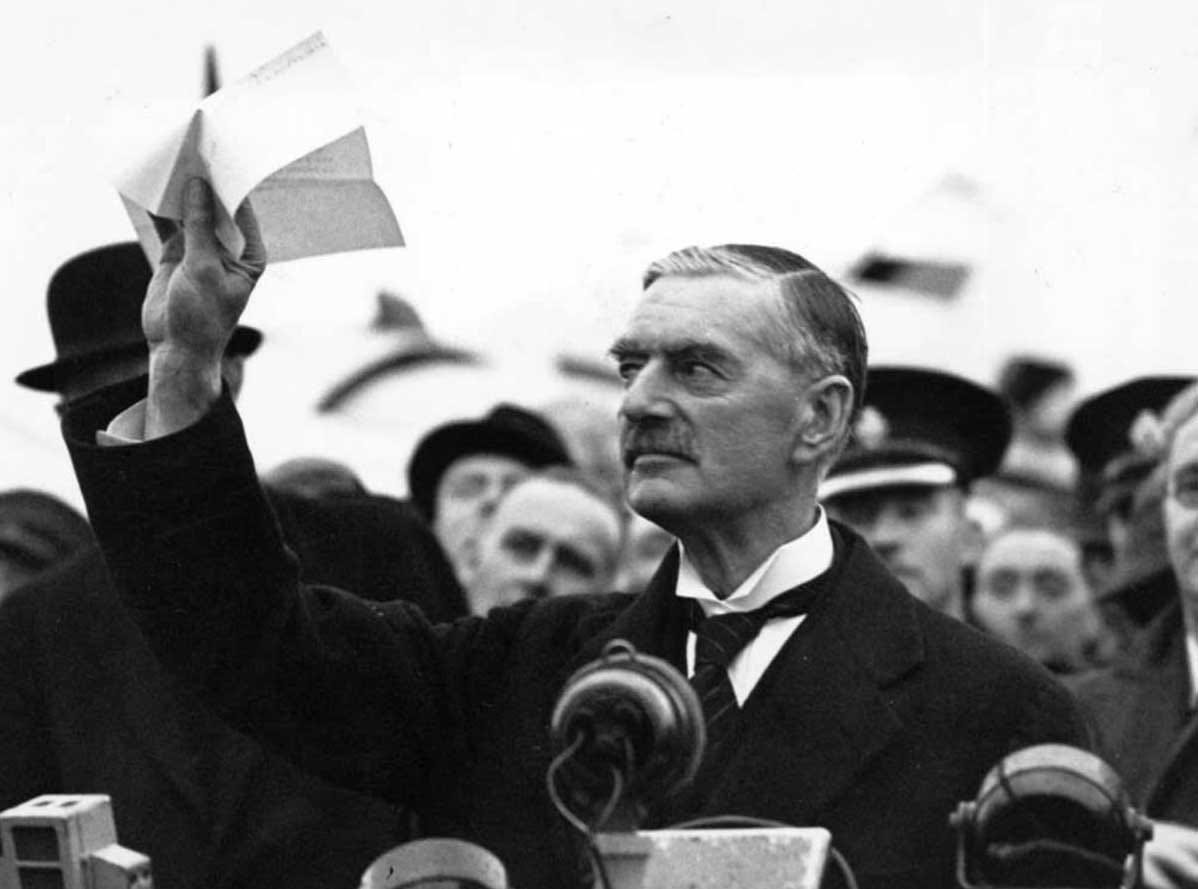In 1938, then British Prime Minister, Neville Chamberlain, uttered a phrase that was nodded at in approval at the time and, today, would cause a shock-wave of outrage. Upon Germany’s repossession of the Sudetenland and its ultimate conquest of Czechoslovakia, Chamberlain referred to the victim as a far-off land of which we know little.
Neville Chamberlain vaunts high in his banner the Treaty of Munich.
It’s a phrase that comes within an ace of out of sight, out of mind or, more callously, what the eye does not behold, the heart does not grieve over. I wonder who there may yet be on this globe who has not grieved over Ukraine, for no better reason that they have not once heard of this local, global conflict. That is, aside from those who do not grieve but have, indeed, heard every detail.
I recently cited Munich 1938 as a brave endeavour by a blue-eyed hopeful to find an impossible peace. Blue-eyed Chamberlain may have been, but he was constrained by the ties that bind the world of diplomacy. Yet, diplomacy is already too late, for it is implemented only when the die is set. Nevertheless, vain, too late or otherwise, it is a process that must be gone through. I was derided by those who have already discounted Russia as a pariah, cast it out from civilisation, blanked it from their minds. And me, it would seem, with it. I am a blue-eyed, pro-Russian troll. Welcome to today.
A war zone is a pawn in a game and, whether as belligerent, supporter, detractor or neutral, one’s stance is dependent on one’s interests in the game’s outcome. You may have an interest in the territory being fought over or in the bodies politic engaged in the conflict. I sometimes wonder how readily nations that declare their neutrality believe in the credence supposedly garnered in their neutral position: do they really believe that outsiders are convinced when they profess to have no interest whatsoever in the war? They must believe what they wish to believe and, insofar, what they believe is indeed an aspect of a far-off land of which we know little.
Of many of them we know one thing: that they will not place principle allied to either cause high in their banner, nor will they elect a hoped-for victor until such time as that victor is beyond being hoped-for and confirmed. It is cowardice in the extreme, and it is pragmatism at its utmost. The best tool that can be summoned to labour for its achievement is hope; that, and whatever underhand dealings are engaged in out of public sight, and over which no heart can grieve. Hope is often, by analogy, also the prime tool in many a belligerent’s toolbox. That much neutrals have in common with them.
“We sail our own ship,” they would retort; and indeed they do. And, as they do, they are the masters of their fate, the captains of their souls. “What is it to us,” they reply, “if you choose to wage war with each other and cause death and destruction to each other?”
Is that right? Do belligerents choose? If you held a free, national poll in Russia right now and asked them “Should Russia continue or stop its war with Ukraine?” how many hearts would say which? Perhaps, even more interestingly, how many in Ukraine would say which? How many in other countries would say which? (Aside from neutral countries, of course: they have no say in such matters.) About war one can assert two certain things: they are never vaunted as a manifesto promise in an election; and elections are never held, not properly, in war zones. It is a very brave assertion to contend that peoples choose war.
And yet, I read yesterday this assertion and, what is more, by a Ukrainian pacifist: “You’ve got 40 million united Ukrainians, so what will Putin do? Will he massacre 40 million people? That’s the only way he can win this war. The only way.”
To which I offer this reply, which is predicated on some assumptions, but ones that are not wild:
- that Russia cannot win in Ukraine;
- that Ukraine cannot win in Ukraine;
- that Putin will not be deposed by Russians;
- that Putin cannot be deposed by non-Russians; and
- that neither side will give up.
The response is this: that massacring 40 million Ukrainians may be a way to end the war. But another way is to massacre 144 million Russians. There is a third way: the massacre of 184 million.
Anybody, neutral or no, who professes not to have the slightest interest in any of those outcomes is an outcast of this world’s community. And, because it is a product of choice, over it, they may not grieve.




